
views
Hours after the Enforcement Directorate (ED) arrested V Senthil Balaji, a cabinet minister in the DMK-led government in Tamil Nadu, the state withdrew its general consent to the CBI for investigating cases in its jurisdiction, becoming the 10th state in the country to do so.
However, despite the move by opposition-ruled states, senior officers of the Central Bureau of Investigation (CBI) said the action by the states was merely ‘symbolic’ and ‘political optics’.
It does not affect the pending investigation as it does not have retrospective effect and the states cannot prevent a central investigation if it is directed by the court or by the central government, said a senior officer of CBI.
Since 2018, 10 states primarily ruled by the Opposition — Andhra Pradesh, West Bengal, Jharkhand, Chhattisgarh, Kerala, Meghalaya, Mizoram, Punjab, Rajasthan, Telangana and Tamil Nadu — have withdrawn general consent to CBI.
“Withdrawal of general consent means that CBI will not be able to investigate cases filed under the Prevention of Corruption Act, commonly called the PC Act, in the respective states. However, if any case is handed over to the CBI by the central government or by the court, there is no restriction,” said the officer.
What is general consent?
CBI derives its power to investigate from the Delhi Special Police Establishment Act (DSPE), 1946, which has multiple sections explaining the central agency’s power and jurisdiction.
According to Section 1 of the Act, “CBI can investigate offences in the Union Territories only. However, the jurisdiction can be extended by the Central Government to other areas including Railway areas and states under Section 5(1) of the Act, provided the State Government accords consent under Section 6 of the Act.”
“The executive officers of CBI of the rank of Sub Inspector and above, exercise all powers of a station office in-charge of the police station for the concerned area for the purpose of investigation. As per Section 3 of the Act, Special Police Establishment is authorised to investigate only those cases, which are notified by the Central Government from time to time.”
Section 6 of the Act says, “Consent of the state Government is needed to exercise powers and jurisdiction.” However, it adds that approval of the central government to conduct inquiry or investigation is needed for a case. The CBI shall not conduct any enquiry or investigation into any offence alleged to have been committed under the Prevention of Corruption Act, 1988 (49 of 1988) except with the previous approval of the central government.
Why is withdrawal of consent more ‘symbolic’ than absolute?
With general consent given by a state, CBI gets the authority and jurisdiction to investigate cases lodged under the PC Act in a particular state. However, the CBI can probe any case once the court directs the central agency to do so or the Union government hands over the investigation to the CBI.
In India’s federal structure, law and order is a state subject so CBI, unlike ED, cannot take up any case — lodged under IPC or any other relevant section — on its own. For taking up a case for investigation, the central agency will need the Union government’s approval, the respective state’s recommendation or court’s direction.
In 2018, Andhra Pradesh, followed by West Bengal, withdrew general consent to the CBI. The Bengal government took the decision after the CBI summoned several senior leaders of ruling Trinamool Congress, arrested its ministers and seized over a dozen paintings by chief minister Mamata Banerjee in connection with the ponzi scam investigation.
In a similar fashion, other states ruled by a regional party and a political opponent of BJP withdrew general consent as and when CBI probed into cases of corruption that had allegedly involved politicians of ruling parties in the state.
However, a close analysis in the cases will show how the withdrawal of consent could not stop the CBI from investigating certain cases. For instance, five years after the withdrawal of consent, CBI is probing multiple cases in Bengal, which include coal scam, cattle scam, teacher recruitment scam and municipality recruitment scam as these cases were either handed over to the CBI by the Centre or directed by the court.
Talking to News18, another serving officer of CBI said: “Withdrawal of consent is politically symbolic in nature. Apart from optics and sending a message of unity, it does not affect the cases. With no consent, CBI will not be able to investigate cases lodged under the PC Act in a state. That is all. But the major cases come to CBI by the court’s intervention or central government’s notifications.”
The officer added: “The idea of not allowing investigation by the central agency also falls flat with ED probing multiple such cases. The ED does not need general consent and can probe any case across states and UTs.”

















Comments
0 comment